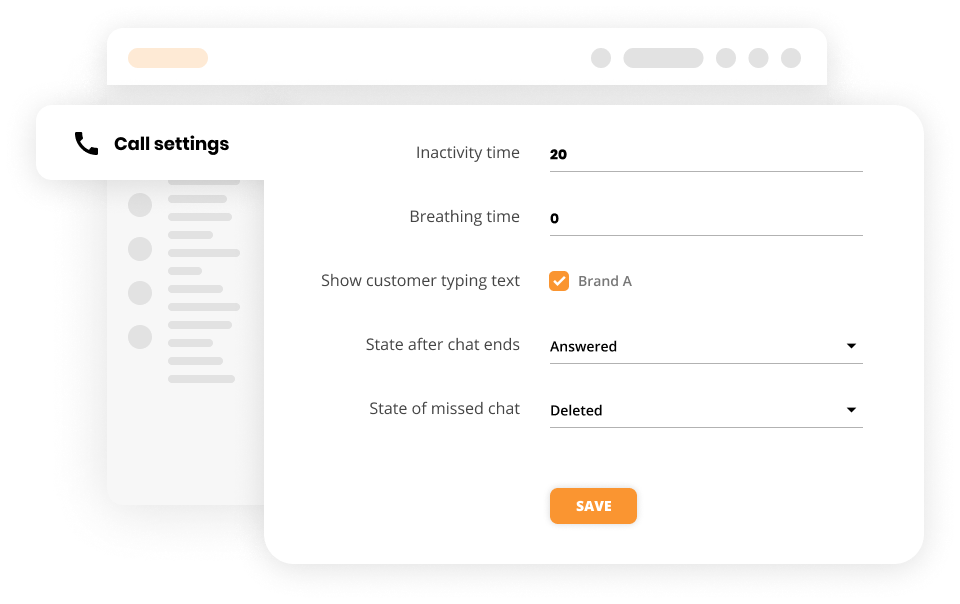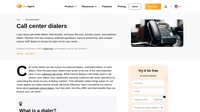What is SIP calling?
SIP calling is also known as Session Initiation Protocol calling. Session Initiation Protocol is a signaling protocol used for initiating, maintaining and terminating communication sessions over VoIP and other Internet and cloud-based communication platforms. SIP calling is often interchanged with VoIP calling, however, that isn’t exactly correct. VoIP (Voice over Internet Protocol) is a broader term that refers to a group of technologies used for sending and receiving phone calls made over the internet rather than traditional phone lines. While SIP is one individual technology that supports VoIP. In addition to voice calls, SIP protocol is used to transmit various data, including video chats and video calls, video conferencing, instant messaging and other multimedia communications.
Apart from initiating telephone calls, a SIP phone system is capable of performing other VoIP functions, such as identifying user location, determining their availability to respond and whether the recipient’s device is compatible with the initiated call type, transferring and terminating calls, etc.

How does SIP calling work?
A traditional phone system consists of three core parts:
- Private Branch Exchange (PBX), an on-premises telephone system that manages calls.
- Primary Rate Interface (PRI) lines that connect calls to the PSTN.
- Public Switched Telephone Network (PSTN) that routes calls to their destination.
SIP calling basically allows omitting PRI lines as it uses a SIP trunk (which is a virtual connection) that directly connects PBX with PSTN over the Internet. SIP calling also removes the need for multiple phone lines which allows for easier and cheaper scalability as compared to using traditional business phone lines.

Since each SIP trunk can hold an unlimited number of channels (a channel is equivalent to one incoming or outgoing call), a business would require a single SIP trunk regardless of the number of concurrent calls. Instead of purchasing additional phone lines that usually come in clusters of 23 (which is typically more than actually used), with SIP calling you can buy one channel at a time only when it’s needed. Besides, SIP calling provides significant cost-savings in business communications as local, long-distance and international calls can be made by simply using the internet connection.
Start your free trial today
Learn all about LiveAgent and how it can help you improve your call center customer service.
Watch a video about SIP calling
SIP calling and LiveAgent helpdesk software are two products that can be seamlessly integrated, providing business owners with a unified communication experience for their customers. This integration allows customers to place calls directly to the helpdesk and for helpdesk agents to easily access customer information and knowledge bases. With SIP calling, businesses can save time and money by making calls more efficient, and LiveAgent helpdesk software ensures customer service is always at the highest level.

Frequently Asked Questions
Does VoIP require SIP?
While VoIP can operate without SIP, it is a commonly used protocol for enabling VoIP communication. However, it is not the only option available. Other protocols, such as H.323, can also be used for VoIP communication. SIP is often preferred due to its flexibility, extensibility, and compatibility with other internet protocols.
What are the benefits of SIP calling?
SIP calling unlocks an array of benefits for businesses. A SIP phone system is easy to set up, manage and scale whenever needed without the need for adding more telephone lines. It allows for greater cost efficiency by eliminating multiple networks, excess hardware, installation and maintenance costs. Since SIP calls can be received on all kinds of laptop and mobile devices and easily routed, that helps make your business more available for customers and employees.
Who should use SIP Calling?
SIP calling is widely adopted by small businesses and startups in a variety of sectors due to its effortless implementation, flexibility, easy accessibility across devices, scalability, reliability and cost efficiency. Many organizations use it for both external and internal communications. Though larger businesses might be challenged by switching to SIP trunking and taking their PBX system to the cloud, they can also benefit from the long-term cost savings on their communication expenses.
Is it possible to make SIP calls in LiveAgent?
LiveAgent call center software can be integrated with a variety of third-party apps, including a number of SIP trunking providers, such as Twilio. You can easily connect softphones as another device, add your SIP provider and make SIP calls in LiveAgent, while these calls will still be handled, recorded and tracked by LiveAgent’s own robust network infrastructure. For adding your own SIP provider into LiveAgent, please refer to this guide: Integration of SIP provider for hosted licenses.
Depois de entender o que é e como funciona a chamada SIP, você pode querer explorar mais sobre como essa tecnologia pode melhorar seu atendimento ao cliente. Descubra como implementar essa solução pode otimizar a comunicação e aumentar a satisfação dos seus clientes.
Professional call recording software
Discover LiveAgent's top-rated call recording software for 2024, offering crystal-clear sound, unlimited recordings, and no setup fees. Perfect for quality assurance, legal protection, and agent training. Enjoy a free 30-day trial with no credit card required. Join industry leaders like Forbes and Airbus in optimizing your customer service with our easy-to-use, all-in-one platform. Start today!
Discover seamless VoIP integration with Sipgate and LiveAgent! Enjoy cost-efficient, easily manageable VoIP services for your call center without additional fees. Connect effortlessly to enhance customer experience with multiple device compatibility. Try Sipgate integration with LiveAgent today with a 30-day free trial!

 Български
Български  Čeština
Čeština  Dansk
Dansk  Deutsch
Deutsch  Eesti
Eesti  Español
Español  Français
Français  Ελληνικα
Ελληνικα  Hrvatski
Hrvatski  Italiano
Italiano  Latviešu
Latviešu  Lietuviškai
Lietuviškai  Magyar
Magyar  Nederlands
Nederlands  Norsk bokmål
Norsk bokmål  Polski
Polski  Română
Română  Русский
Русский  Slovenčina
Slovenčina  Slovenščina
Slovenščina  简体中文
简体中文  Tagalog
Tagalog  Tiếng Việt
Tiếng Việt  العربية
العربية  Português
Português 







